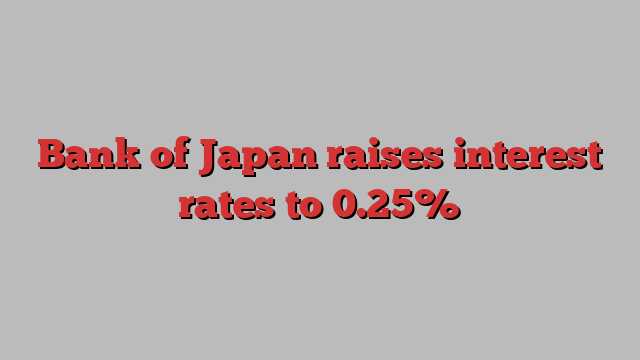
Unlock the Editor’s Digest for free
Roula Khalaf, Editor of the FT, selects her favourite stories in this weekly newsletter.
The Bank of Japan has lifted its benchmark interest rate to 0.25 per cent and outlined plans to halve its monthly bond purchases in a decisive move to tighten monetary policy.
With the US Federal Reserve set to move in the opposite direction, the BoJ’s shift to tighter policy will start to narrow an interest rate gap that has been driving record weakness in the yen, marking a big shift for global currency markets.
By a majority of 7-2, the BoJ raised its overnight interest rate to “around 0.25 per cent”, the highest level since the global financial crisis in late 2008, from a previous range of zero to 0.1 per cent. The bank in March ended its negative interest rate policy following decades of on-and-off deflation.
The BoJ on Wednesday also said it would scale back its ¥6tn ($39bn) monthly bond-buying programme to about ¥3tn in January to March of 2026.
The rate rise came after senior government officials made unusually blunt comments in recent weeks, putting pressure on the BoJ to unwind its ultra-loose monetary policy and arrest the yen’s decline.
“The bank judged it appropriate to adjust the degree of monetary accommodation from the perspective of sustainable and stable achievement of the price stability target of 2 per cent,” it said in a statement. “Accommodative financial conditions will continue to firmly support economic activity.”
Ahead of the policy decision, traders were evenly split on the prospect of the BoJ lifting short-term interest rates, with some economists cautioning against a rate rise after a string of weak economic data.
Core inflation, which excludes volatile food prices, rose 2.6 per cent from a year earlier in June, exceeding the BoJ’s 2 per cent target for 27 consecutive months. However, Japan’s economy contracted in the first three months of the year as the yen’s decline and rising living costs hurt household spending.
“It’s extremely disappointing that the BoJ has chosen to act by ignoring weak economic data. It now looks like it moved to counter the weak yen,” said UBS economist Masamichi Adachi. “The normalisation of Japan’s economy was very precarious to begin with, but the BoJ has made it even more difficult.”
For the fiscal year to March 2026, the BoJ said it expected consumer price inflation of 2.1 per cent, instead of the 1.9 per cent it forecast in April.
Growing expectations of a rate rise boosted the yen against the dollar in the run-up to Wednesday’s meeting. A suspected government intervention this month had the effect of squeezing a substantial volume of short yen positions out of the market, said traders, tamping-down the so-called carry trade.
But hedge funds are likely to still have significant short positions in the Japanese currency, so the combination of the BoJ move and a dovish tone by the US Federal Reserve later on Wednesday could provoke another sharp move higher for the yen.
The yen traded slightly weaker at ¥153.24 against the dollar after the policy decision on Wednesday.
Yujiro Goto, Nomura’s chief foreign exchange strategist, said the market was likely to test ¥150 against the dollar over the coming days.
The yen’s upward momentum could also be accelerated, he said, if Japanese retail investors decide to unwind their large bets on US equities and convert dollar profits back into yen.